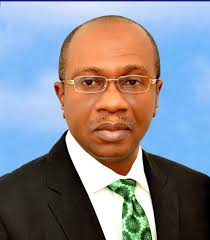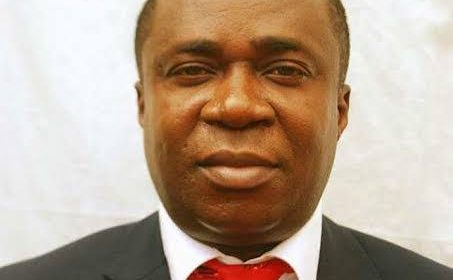Emefiele Faults Claims of Imbalance in Agric Interventions …Tasks Stakeholders on Food Security

The Governor, Central Bank of Nigeria (CBN), Mr. Godwin Emefiele, has faulted claims in certain quarters suggesting that the Bank’s targeted interventions in the agricultural sector are tilted in favour of a certain section of the country.
Mr. Emefiele made the clarification in Ado-Ekiti, Ekiti State, on Tuesday, May 18, 2021,
while unveiling the 2020 wet season harvest aggregation and flag-off of the 2021 wet
season input distribution in the South-West geo-political zone under the CBN-RIFAN
Anchor Borrowers’ Programme.
According to him, contrary to views held by some individuals and interest groups, the
Bank’s interventions in the Anchor Borrowers’ Programme (ABP) were not only about
rice production but had expanded to over 21 crops and were evenly spread across the
country.
Describing criticisms against the Bank’s effort at boosting agriculture in Nigeria as
unfair, he disclosed that more than N300 billion had been disbursed to companies
operating in the southern part of Nigeria, citing companies and farmers across Lagos,
Edo, Ondo, Ogun, Osun, Ekiti, Bayelsa, Rivers, Cross River as major beneficiaries of
the Bank’s interventions.
Meanwhile, Mr. Emefiele charged stakeholders in the various crop value chains in the
Nigeria to continually make consistent and positive strides towards attaining food
security, noting that attaining self-sufficiency in food production will not come cheap.
While acknowledging the current challenges in attaining food security in Nigeria, he said
synergy among stakeholders will surely catalyse the growth process, assuring that the
CBN stood ready to offer effective partnership to deliver on this critical national mandate
of attaining self-sufficiency in food production.
According to him, the sustainability of Nigeria’s current efforts in agricultural production
can only be guaranteed if youths are attracted into agriculture as they remain the future
of the Country.
He therefore enjoined Nigerian youths to embrace agriculture, noting that the “They
have the talent, energy, enthusiasm, technological adoption capacity and all the right drive to revolutionize agricultural production in Nigeria.
“We must meet them half-way to ensure that we provide the enabling environment to
make agriculture attractive to them,” he noted, adding that “the Central Bank of Nigeria
stands ready to support youths that are willing to engage in agriculture.”
The CBN Governor disclosed that a total of 3,107,890 farmers had been financed for
the cultivation of 3,801,397 hectares across 21 commodities through 23 Participating
Financial Institutions in the 36 States of the Federation and FCT, from the inception of
the programme till date. He added that under the 2020 wet season CBN-RIFAN
partnership, the Bank had also financed 221,450 farmers for the cultivation of 221,450
hectares in 32 States.
Emefiele equally disclosed that the Bank planned a minimum 1 million hectares of rice
through a combination of RIFAN farmers and prime/private anchors for each planting
season in 2021. While also unveiling aggressive production plans for maize, wheat,
soybeans, cassava, sorghum and cassava, he noted that the Bank’s backward
integration drive with rice millers was also gaining momentum as the CBN intends to
finance some millers to grow their own paddy during the current wet season.
The CBN Governor also restated the Bank’s resolve to partner with the fiscal authorities
to ensure the integration of Nigerian farmers into the Government’s Economic
Sustainability Programme aimed at providing five million homes with electricity using
solar energy. He also urged famers to repay their loans in order to sustain the Anchor
Borrowers’ Programme (ABP).
He explained that, under the programme, every farmer with a good repayment record in
the Anchor Borrowers’ Programme would be eligible to get a solar home system that will
provide electricity to power their essential home appliances.
According to him, the Bank will develop a repayment framework that will allow farmers
to use their farm produce as repayment for the electricity consumed by the beneficiaries
of the scheme. This is even as he expressed hope that the incentive would improve the
standard of living of farmers in Nigeria, motivate prompt loan repayment and ultimately
enhance the sustainability of the programme.
“Loan repayment is the hallmark of every credit cycle and the sustainability of the
programme is hinged on farmers’ ability and willingness to repay their loans, and we are
constantly engaging with them to enhance their trust in the system,” Emefiele noted.
Unveiling what he described as the first ever grain pyramid in the South-West, Mr.
Emefiele also expressed strong optimism that the event would generate the required
momentum to catalyse rice cultivation in the region and provide a sustainable source of
paddy for the numerous rice mills springing up in the South-West and its environs.
While reiterating the massive potential in Nigeria’s agricultural sector, he stressed the
need for more private sector investment in the agricultural value chain, noting that
significant improvements in domestic production of staple food items, would help in
attaining the country’s price stability goals while reducing its dependence on imported
food items.
The CBN Governor further revealed that the revamped Nigeria Commodity Exchange
(NCX), into which the Bank and its partners had committed the sum of N50 billion, will
commence operation by the fourth quarter of 2021. According to him, “a vibrant
commodity exchange will significantly enhance post-harvest handling, guarantee
effective pricing for farmers, minimize the adverse effect of middlemen and commodity
hoarders and ultimately transfer the gains from primary production to other nodes of the
value chain.
In his remarks, Governor of Kebbi State, Senator Abubakar Atiku Bagudu, who
represented President Muhammadu Buhari and doubles as the Vice Chairman, National
Food Security Council, said the rice pyramids unveiled in Ekiti underscored the clarion
call by President Muhammadu Buhari for Nigeria to “produce what we eat and eat what
we produce”.
While commending the Ekiti State Governor for cueing into the rice revolution, he said
each state in Nigeria had the capacity to produce rice, hence the need for states to
compete to develop their respective potential.
Bagudu disclosed that over 50 new rice mills had come on board in Nigeria, signaling
that Nigeria was drawing closer to its quest for self-sufficiency in food production.
According to him, the recently released data by the National Bureau of Statistics (NBS),
indicating a downward trend in inflation, was indicative of the strong performance of the
agricultural sector, which he also noted was responsible for the quick exit of Nigeria
from two successive recessions.
Also speaking, the host Governor, Dr. Kayode Fayemi noted that the support of
President Buhari for local rice production, through the CBN’s Anchor Borrowers’
Programme (ABP), had contributed largely to the investments in agriculture, which in
turn had contributed to increased rice production and reduction in rice importation.
While recalling that Ekiti State used to be the leader in rice production in the South-
West geo-political zone, Gov. Fayemi declared that the State was determined to
He said his administration was determined institutionalize commercial agriculture and
make it more profitable to the populace. He added that Ekiti State was committed to
changing the narrative by reviving agriculture and transforming subsistence farming to
commercial production across different crops with the aim of creating job opportunities
for farmers and other sectors of the economy.
In their various remarks, the Governors of Ondo (Rotimi Akeredolu), Jigawa (Mohammed Badaru Abubakar) and Osun (Adegboyega Oyetola) stressed the need for greater attention to be given to agriculture import substitution, even as they commended the CBN Governor for his vision in putting the country first by supporting agriculture.







Leave a Reply